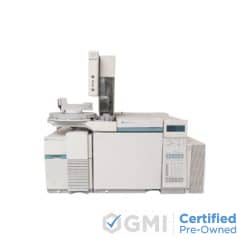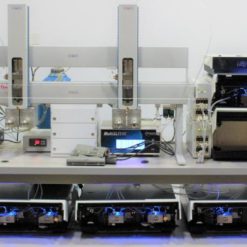Certified Pre-Owned, Mass Spectrometry
Introduction to Mass Spectrometry: What It Is and Why It’s Important
Introduction
In the vast world of scientific analysis, mass spectrometry (MS) is a fundamental technique with many applications. Its ability to identify and quantify molecules accurately has made it indispensable in various fields such as pharmaceuticals, environmental science, forensics, and proteomics. In this blog post, we will introduce mass spectrometry basics and explain why this analytical tool holds immense importance in modern research.
What is Mass Spectrometry?
Mass spectrometry is an analytical technique to determine ions’ mass-to-charge ratio (m/z) in a given sample. It involves the ionization of molecules, separation of ions based on their mass-to-charge ratio, and subsequent detection and analysis of the separated ions. The resulting data provides valuable information about the sample’s molecular structure, composition, and concentration.
Working Principle:
The mass spectrometer consists of three essential components: an ion source, a mass analyzer, and a detector. The process begins with ionization, where the sample is subjected to different ionization techniques such as electron impact, electrospray ionization, or matrix-assisted laser desorption/ionization (MALDI). These techniques convert the sample into charged particles or ions.
The ions are then introduced into the mass analyzer and separated based on their mass-to-charge ratio. Various mass analyzers exist, including magnetic sector, quadrupole, time-of-flight (TOF), and ion trap, each with unique characteristics and applications.
Finally, the separated ions are detected and measured by the detector. The resulting mass spectrum, which displays the abundance of ions at different m/z values, is used for qualitative and quantitative analysis of the sample.
Importance of Mass Spectrometry:
- Identification of Compounds: Mass spectrometry allows scientists to identify unknown compounds accurately by comparing their mass spectra with reference databases. This capability is crucial in fields such as drug discovery, metabolomics, and environmental analysis, where the identification of complex compounds is essential.
- Quantitative Analysis: Mass spectrometry enables precise quantification of compounds in a sample. Its high sensitivity and wide dynamic range make it an indispensable tool for determining the concentration of target analytes. This is particularly valuable in clinical diagnostics, pharmaceutical quality control, and environmental monitoring.
- Structural Elucidation: Mass spectrometry provides invaluable insights into the structural composition of molecules. Fragmentation patterns obtained from the mass spectra can be used to deduce the connectivity and arrangement of atoms within a molecule. This aids in understanding the behavior, reactivity, and synthesis of complex organic compounds.
- Proteomics and Metabolomics: Mass spectrometry is pivotal in proteomics and metabolomics research. It enables identifying and quantifying proteins and metabolites, leading to a deeper understanding of biological processes, disease mechanisms, and biomarker discovery.
- Forensic Science: Mass spectrometry has revolutionized forensic analysis, facilitating the identification of drugs, explosives, and trace evidence. Its ability to detect minute quantities of substances and distinguish between different compounds has significantly advanced the field of criminal investigation.
“GMI is my first stop for all laboratory equipment when I need the order to be right and delivered fast. Their customer care is unmatched in the industry.”
Robert Brodnick
Conclusion
Mass spectrometry is a powerful analytical technique that has revolutionized scientific research in numerous disciplines. Its ability to provide precise identification, quantification, and structural information has made it an indispensable tool for scientists worldwide. As technology advances, mass spectrometry will undoubtedly play a pivotal role in shaping our understanding of the natural world and driving innovation in various industries.







